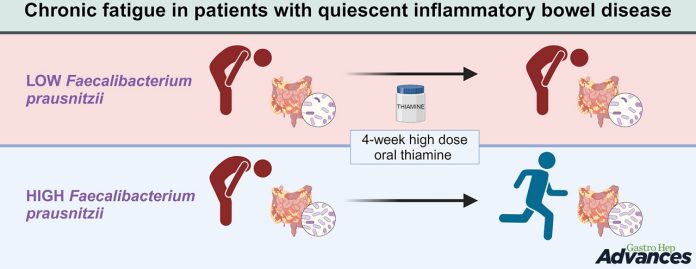
Fatigue is a common and exhausting symptom for many people with inflammatory bowel disease (IBD).
Now, a new study from Denmark sheds light on why vitamin B1, also known as thiamine, helps some IBD patients feel more energetic, while others do not see the same benefits.
The study, published in the journal Gastro Hep Advances, suggests that gut bacteria play a key role in how patients respond to vitamin B1.
According to the study, about half of the fatigued IBD patients who took vitamin B1 reported feeling less tired.
However, researchers could not previously understand why only some patients benefited from the treatment.
This new research points to a specific “good” gut bacterium called Faecalibacterium prausnitzii (FP) as the key factor.
Professor Christian Lodberg Hvas, the lead author of the study, explained, “We now know that it’s particularly the presence of FP that helps determine whether a patient will benefit from vitamin B1 treatment.”
FP is known to have health benefits and is often found in people with a healthy gut.
The surprising discovery in this study was that the presence of this one bacterium seemed to be the deciding factor in whether patients experienced relief from fatigue after taking vitamin B1.
The study involved 40 IBD patients who were suffering from chronic fatigue. Each patient received both vitamin B1 and a placebo (a fake treatment) over two separate four-week periods, with a break in between.
This allowed researchers to compare the effects of the vitamin against the placebo. During the study, the team also examined the patients’ gut bacteria to find out if there was any link between specific bacteria and the effectiveness of the treatment.
The results showed that patients with higher levels of FP in their gut were more likely to benefit from vitamin B1.
However, the researchers are still unsure why this bacterium plays such an important role in reducing fatigue.
“FP is commonly found in healthy people, but it’s less present in those with chronic illnesses,” said Professor Hvas. “We don’t yet know if this bacterium is just a marker of good health or if it actually helps keep people healthy.”
For patients experiencing unexplained fatigue that can’t be linked to common causes like low iron, vitamin D deficiency, or thyroid problems, high-dose vitamin B1 treatment might be an effective option.
Although it works for only about half of the patients, it is affordable and has no side effects, making it worth trying for many.
However, Professor Hvas warned that patients should expect some changes when taking high doses of thiamine. “Thiamine has a strong smell and taste, so your hands, urine, and sweat may smell like vitamin pills during the treatment,” he added.
This study offers hope for many IBD patients struggling with unexplained fatigue and provides a potential new approach to managing this challenging symptom.
If you care about nutrition, please read studies about how Mediterranean diet could protect your brain health, and the best time to take vitamins to prevent heart disease.
For more information about nutrition, please see recent studies that olive oil may help you live longer, and vitamin D could help lower the risk of autoimmune diseases.



